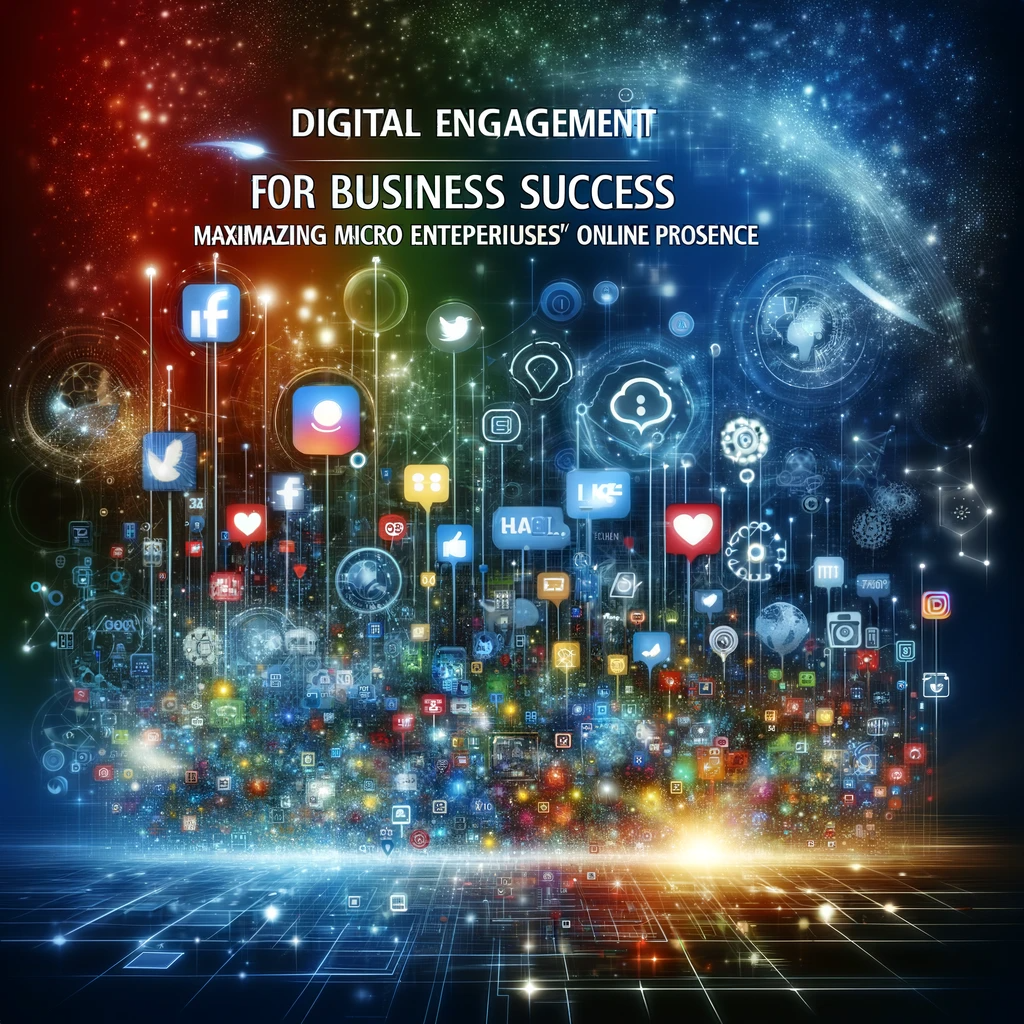In an ever-evolving digital landscape, micro-enterprises must adapt swiftly to stay competitive and relevant. As technological advancements redefine the business terrain, startups within accelerator programs can leverage these innovations to enhance their growth and sustainability. This article delves into the latest tech trends and discusses how micro-enterprises can integrate them effectively.
Embracing Artificial Intelligence and Machine Learning: “Harnessing the Power of AI and ML: Transforming Micro Enterprises in the Digital Age”

Artificial Intelligence (AI) and Machine Learning (ML) are revolutionizing various industries by enabling smarter decision-making and automating complex processes. Startups can use AI to gain insights from data analytics, enhance customer experiences, and streamline operations. Within accelerator programs, micro-enterprises should focus on harnessing AI to create innovative solutions that meet market demands.
By leveraging AI, micro-enterprises can automate repetitive tasks, improve operational efficiency, and reduce costs. For example, AI-powered chatbots can handle customer inquiries, freeing up human resources for more complex tasks. ML algorithms can analyze large datasets to identify patterns and trends, enabling startups to make data-driven decisions. Accelerator programs can provide micro-enterprises with access to AI tools, mentorship, and training to develop and implement AI solutions effectively.
The Rise of Blockchain Technology: “Building Trust and Transparency: How Blockchain Revolutionizes Micro Enterprises”
Blockchain technology offers a secure and transparent way to conduct transactions and store data. Its decentralized nature makes it an ideal solution for startups looking to establish trust with their customers. Micro-enterprises can utilize blockchain for various applications, including supply chain management, digital identity verification, and secure financial transactions.
Startups within accelerator programs can explore blockchain’s potential to streamline processes and reduce intermediaries. By implementing blockchain solutions, micro-enterprises can improve transparency, traceability, and security in their operations. For example, blockchain can be used to track the origin of products, ensuring authenticity and reducing the risk of counterfeit goods. Accelerator programs can provide micro-enterprises with access to blockchain expertise, development tools, and networking opportunities to leverage this technology effectively.
Leveraging the Internet of Things (IoT): “Unlocking the Potential of IoT: Optimizing Micro Enterprises for a Connected Future”

The Internet of Things (IoT) connects physical devices to the internet, enabling them to collect and exchange data. This interconnectivity can help startups optimize resource usage, improve product functionality, and offer personalized customer experiences. IoT is particularly useful in sectors like healthcare, agriculture, and smart home technology.
Micro-enterprises can benefit from integrating IoT into their products and services. For example, in agriculture, IoT sensors can monitor soil moisture levels, enabling farmers to optimize irrigation and reduce water waste. In healthcare, wearable devices can track patients’ vital signs and transmit real-time data to healthcare providers. Within accelerator programs, micro-enterprises can learn how to integrate IoT technologies into their offerings, explore new business models, and address security and privacy concerns associated with IoT deployments.
Cloud Computing and Storage Solutions: “Scaling for Success: Empowering Micro Enterprises with Cloud Computing”
Cloud computing provides scalable and cost-effective resources for startups. It allows businesses to access high-level computing power without significant upfront investments. By adopting cloud storage and computing solutions, micro-enterprises in accelerator programs can enhance their flexibility and collaboration capabilities.
Cloud computing offers startups the ability to store and process large amounts of data, host applications, and scale their infrastructure as needed. Cloud-based software and platforms also enable remote work and collaboration, which has become increasingly important in today’s business environment. Accelerator programs can offer training and mentorship on cloud adoption, cost optimization, and best practices for data management, helping micro-enterprises leverage cloud computing effectively.
The Impact of 5G Technology: “Fast Forward to the Future: Revolutionizing Micro Enterprises with 5G Connectivity”

The rollout of 5G networks promises unprecedented speed and connectivity. This technological leap will enable startups to develop more sophisticated applications, particularly in fields like virtual reality (VR), augmented reality (AR), and streaming services. Micro-enterprises should consider how 5G can elevate their product offerings and customer experiences.
With the increased bandwidth and reduced latency of 5G, startups can deliver immersive AR and VR experiences, enabling customers to interact with products virtually. 5G also opens up opportunities for live streaming, real-time collaboration, and remote monitoring. Within accelerator programs, micro-enterprises can explore the potential of 5G technology, collaborate with experts, and develop innovative applications that leverage its capabilities.
Sustainable and Green Technologies: “Greening the Way Forward: Sustainability Solutions for Micro Enterprises”
Sustainability is becoming a key consideration for consumers and businesses alike. Startups can integrate green technologies to reduce their environmental impact and appeal to eco-conscious customers. This includes adopting energy-efficient practices, utilizing renewable energy sources, and considering the environmental impact of products and services.
Micro-enterprises can incorporate sustainability into their operations by optimizing energy usage, reducing waste, and sourcing eco-friendly materials. For example, startups can implement energy management systems to monitor and control their energy consumption. They can also explore alternative energy sources such as solar or wind power. Accelerator programs can provide micro-enterprises with guidance on sustainable practices, access to experts in green technologies, and networking opportunities with like-minded businesses.
The Power of Big Data Analytics: “Data-Driven Growth: Unleashing the Potential of Big Data for Micro Enterprises”
Big data analytics enables startups to extract valuable insights from large datasets. By analyzing customer behavior, market trends, and operational efficiency, micro-enterprises can make informed decisions that drive growth and innovation. Accelerator programs should provide startups with tools and training to effectively utilize big data.
Micro-enterprises can leverage big data analytics to identify customer preferences, optimize marketing campaigns, and personalize product offerings. By understanding customer needs and trends, startups can tailor their strategies and offerings to meet market demands. Accelerator programs can offer training on data analysis tools, data visualization techniques, and data privacy regulations to help micro-enterprises harness the power of big data.
The Role of Social Media and Digital Marketing: “Digital Engagement for Business Success: Maximizing Micro Enterprises’ Online Presence”

In today’s digital age, a strong online presence is crucial for startups. Social media and digital marketing tools allow businesses to reach a wider audience, engage with customers, and build brand loyalty. Micro-enterprises should develop a coherent digital marketing strategy that aligns with their business goals.
Startups can leverage social media platforms to create brand awareness, engage with customers, and promote their products or services. They can use targeted advertising to reach specific customer segments and track the effectiveness of their marketing campaigns through analytics. Accelerator programs can provide micro-enterprises with guidance on social media marketing, content creation, and digital advertising strategies to maximize their online visibility and drive customer engagement.
Partnering with SmartDev: Elevating Your Startup’s Tech Game

Incorporating the latest tech trends is crucial, but navigating this landscape can be challenging for micro-enterprises. This is where partnering with a service provider like Smart81 becomes invaluable. SmartDev specializes in helping companies integrate cutting-edge technologies into their business model. Their services range from AI and ML implementation, blockchain solutions, IoT integration, to cloud computing and cybersecurity strategies. By collaborating with SmartDev, companies in accelerator programs can access tailored tech solutions that align with their unique needs and goals. The expertise and support offered by SmartDev can significantly accelerate a startup’s journey towards innovation and market leadership.
Conclusion: “Future-Proofing Micro Enterprises: Navigating Tech Trends for Long-Term Success”
For micro-enterprises, staying abreast of the latest tech trends is not just about innovation—it’s a necessity for survival and success. By integrating these technologies within their accelerator programs, startups can optimize their operations, enhance their offerings, and secure a competitive edge in the market. As technology continues to evolve, the agility and adaptability of micro-enterprises will be key to their long-term growth and sustainability.
Accelerator programs play a vital role in supporting micro-enterprises as they navigate the latest tech trends. These programs provide resources, mentorship, and networking opportunities that empower startups to embrace innovation and leverage emerging technologies effectively. By embracing AI and ML, blockchain, IoT, cloud computing, 5G, cybersecurity, sustainability, big data analytics, and digital marketing, micro-enterprises can position themselves as leaders in their respective industries.
In this fast-paced digital landscape, micro-enterprises that proactively embrace tech trends and leverage them to their advantage will be the ones that thrive. By staying informed, adapting to change, and leveraging the support of accelerator programs, micro-enterprises can future-proof their businesses and pave the way for long-term success.
Are you ready to take your startup to the next level with the latest tech trends? Follow Smart81 now to explore how their services can transform your business and future-proof your venture in the dynamic digital landscape. Follow Smart81 for insights, updates, and expert guidance in your tech journey.







